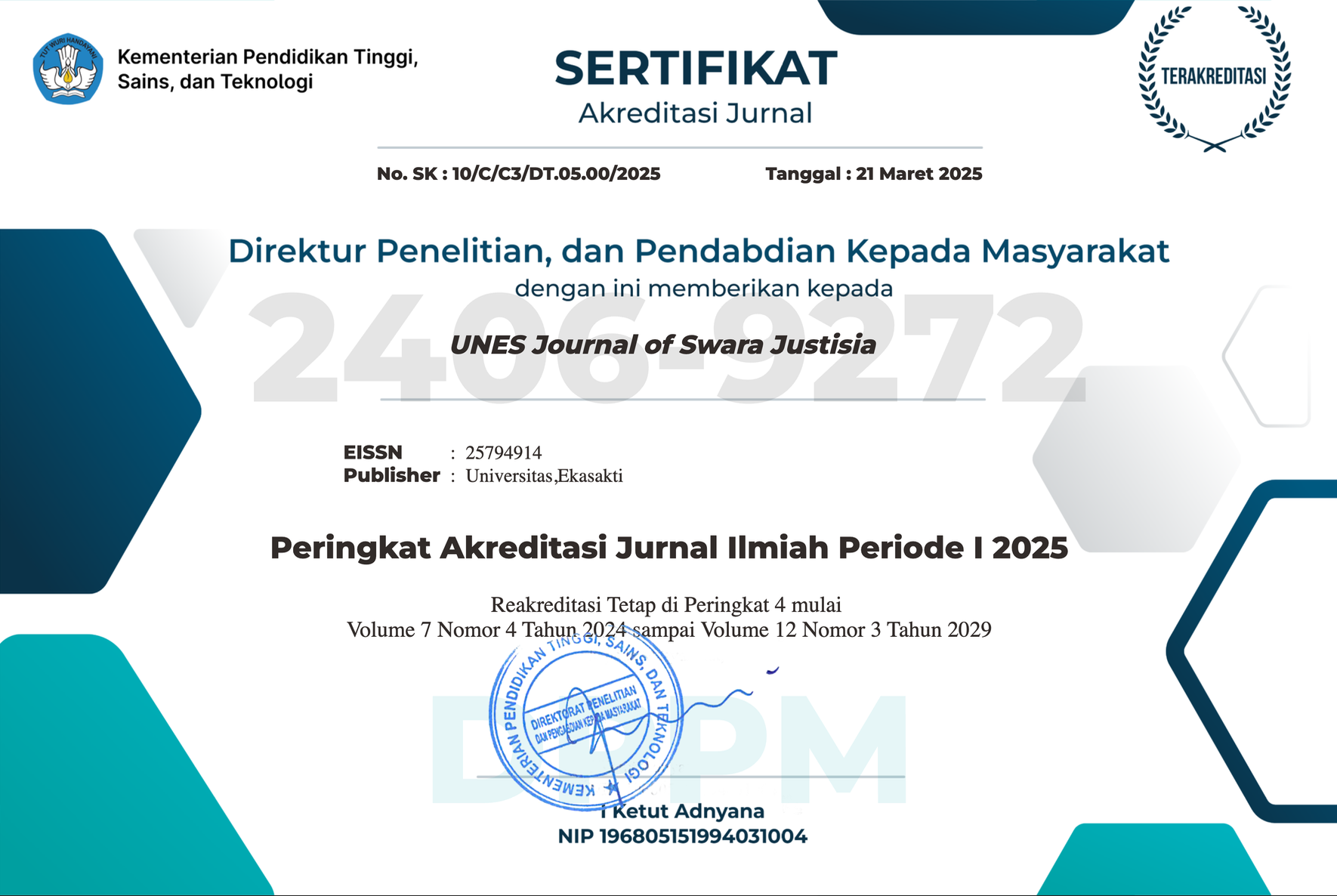Perlindungan Hak Cipta Dari Tindakan Pembajakan Software di Tinjau Dari Hukum Nasional
Downloads
Perkembangan teknologi melahirkan ide-ide kreatif baru dan menciptakan sesuatu yang sebelumnya tidak pernah ada menjadi ada. Dunia digital adalah media utama untuk mewujudkannya. Setiap harinya lebih dari jutaan orang menggunakan atau log in ke internet dengan berbagai macam tujuan, mulai dari riset ilmiah sampai bermain game interaktif di cyberspaces, ataupun mulai dari perdagangan atau e-commerce sampai surfing ke situs perjudian. Dalam hal ini, terdapat instrumen hukum UU No. 28 Tahun 2014 tentang Hak Cipta yang berlaku di Indonesia dimana salah satu objek yang mendapat perlindungan hak cipta adalah program komputer dalam hal ini software. Dengan ini dapat dikatakan bahwa rezim hak cipta mendapat tantangan baru setelah adanya internet dimana salah satunya perlindungan terhadap software ataupun program komputer. Namun pelanggaran terhadap perkembangan zaman ini juga semakin marak terjadi seiring dengan adanya internet. Software adalah suatu Program Komputer yang sering dijadikan sebagai objek pembajakan. Pembajakan software sudah lama menjadi permasalahan yang serius. Pembajakan software yang sering dilakukan yaitu terhadap media CD, Internet, bahkan tidak jarang pula dilakukan secara langsung dari komputer ke komputer lainnya dengan menggunakan kabel data. Akibatnya, Indonesia dihadapkan dengan dampak dan permasalahan pembajakan yang cukup signifikan dan dikenal baik di ranah internasional maupun di Indonesia sendiri. Pengaturan terkait dengan hak cipta melalui Undang-Undang Nomor 28 Tahun 2014 saat ini dianggap masih belum cukup tegas untuk mengatur mengenai tindakan pembajakan software. Oleh karena itu, rumusan masalah dalam penelitian ini yang di kaji adalah : a) Bagaimana bentuk perlindungan hak cipta dari tindakan pembajakan software ditinjau dari hukum internasional b) Bagaimana pengaturan perlindungan hukum hak cipta terhadap program komputer (software) menurut Undang-Undang Nomor 28 Tahun 2014 tentang Hak Cipta dan faktor apa saja yang menjadi hambatan dalam pelaksanaannya. Sedangkan metode penelitian menggunakan penelitian normative yaitu pendekatan penelitian ini berdasarkan bahan pustaka yang merupakan data sekunder atau disebut juga sebagai Penelitian Hukum Kepustakaan. Sedangkan analisa data dilakukan secara kualitatif.
Abdul Kadir Muhammad, 2001, Kajian Hukum Ekonomi Intelektual, Citra Aditya Bakti, Bandung
Abdul Kadir Muhammad,2004, Hukum dan Penelitian Hukum, Bandung: PT Citra Aditya Bakti.
Adrian Sutedi, 2009, Hak Kekayaan Intelektual, Citra Aditya Bakti, Jakarta
Agus Budi Riswandi, 2009, Hak Kekayaan Intelektual dan Budaya HU, Rajawali Pers, Jakarta
Ahmad M. Ramli, 2004, Cyber Law dan HAKI dalam Sistem Hukum Indonesia, Refika Aditama
Asril Sitompul, 2004, Hukum Internet, Citra Aditya Bakti, Bandung
Bambang Sunggono, 2003, Metodologi Penelitan Hukum, Jakarta: PT. Raja Grafindo Persada
Endang Purwasih, 2005, Perkembangan Hukum Intellectual Property Rights,
Gatot Supramono, 2010, Hak Cipta dan Aspek-Aspek Hukumnya, Rineka Cipta, Jakarta
Gunawan Wijaja, 2003, Seri Hukum Bisnis Lisensi, PT Raja Grafindo Persada, Jakarta
Henry Soelistyo, 2011, Hak Cipta Tanpa Hak Moral, Jakarta, Raja Grafindo Persada
J.C.T. Simorangkir, 1979, Hak Cipta Lanjutan II, Djambatan, Jakarta
Prof. Abdul Bari Azed, SH.,MH, 2006, Kompilasi Konvensi Internasional HKI Yang Diratifikasi Indonesia, Dirjen HKI Departeman Hukum dan HAM bekerjasama dengan Badan Penerbit Fakultas Hukum Universitas Indonesia, Jakarta
Soerjono Soekanto, 1982, Kesadaran Hukum dan Kepatuhan Hukum, Jakarta: Rajawali
Suyud Margono, 2003, Hukum Hak Cipta Indonesia, Ghalia Indonesia, Jakarta
Widyopramono, “Tindak Pidana Hak Cipta Analisis dan Penyelesaiannya”, Sinar Grafika, Jakarta
Zainuddin Ali, 2019, “Metode Penelitian Hukum”, Sinar Grafika, Jakarta
Copyright (c) 2024 Delfiyanti

This work is licensed under a Creative Commons Attribution 4.0 International License.
Penulis yang mempublikasikan manuskripnya di jurnal ini menyetujui ketentuan berikut:
- Hak cipta pada setiap artikel adalah milik penulis.
- Penulis mengakui bahwa UNES Journal of Swara Justisia (UJSJ) berhak menjadi yang pertama menerbitkan dengan lisensi Creative Commons Attribution 4.0 International (Attribution 4.0 International CC BY 4.0).
- Penulis dapat mengirimkan artikel secara terpisah, mengatur distribusi non-eksklusif manuskrip yang telah diterbitkan dalam jurnal ini ke versi lain (misalnya, dikirim ke repositori institusi penulis, publikasi ke dalam buku, dll.), dengan mengakui bahwa manuskrip telah diterbitkan pertama kali di UNES Journal of Swara Justisia (UJSJ).
















